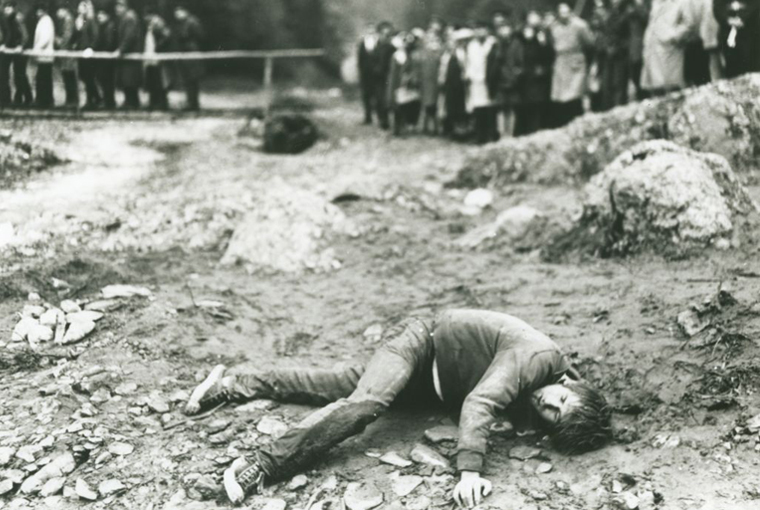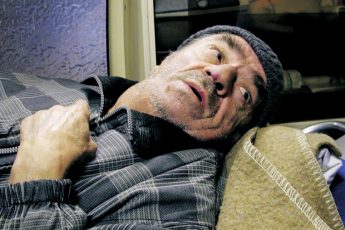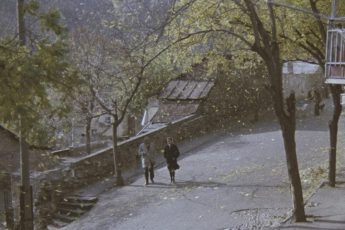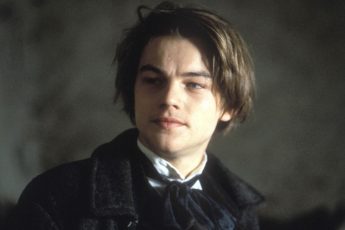Reality and the Like
Lucian Pintilie’s The Reenactment (Reconstituirea, 1967)
Vol. 10 (October 2011) by Konstanty Kuzma
After his surprisingly articulate debut feature Sunday at Six (1965) that centers around the struggles of a young couple, in The Reenactement (1968), Lucian Pintilie tells the story of two friends who, for educational purposes, are forced to reenact a crime they committed. After their graduation party, Vuica and Nicu had gotten drunk and beat up a waiter at a local bar in their town. Instead of sentencing the two young men within the canon of law, the procurator decides to use them as actors for a film that is meant to teach the public about the dangers of alcohol. The production is supervised by the procurator himself, who, although often drawn towards the near-by river to sun-bathe, gives sporadic instructions to his crew. His crew consists of a cameraman, an obedient police officer, an equally submissive friend and assistant, and a teacher – the latter being the only person in the crew who raises doubts about the project. While Vuica willingly subjects himself to the will of the authorities (apart from a short episode when he leaves the set to hide in the forest, which gives rise to a general panic), Nicu seems to share the teacher’s doubts about the project. However, as the comrades do their best in drumming the appropriate doctrines into him, Nicu is seldom allowed to follow his own train of thoughts. It is not until the very end of the film that he makes up his mind about the system…
At the time of completion of The Reenactement, cinema enjoys an overwhelming popularity in Romania with over 6000 cinemas circulating national productions, as well as a cautious selection of international films (today, there are less than 100 cinemas with regular programs in Romania). As Pintilie argues, this dominance of cinema is not necassarily a good thing, at least not if what is being shown is cinema that is not real. The Reenactement becomes a realist piece in spite of the fact that there is little that Pintilie is allowed to say openly (thus drawing the film into an allegorical loop). For Pintilie, realism is not defined by the means, but by the truth that is underlying it, a notion that is surprisingly close to the approach of the comrades in his film (although, unlike Pintilie, they are guided by deceptive motives). It is worth noting that the film is based on a novel by Horia Pătraşcu that is supposedly based on real events. Still, seeing The Reenactement as a simple commentary on the instrumentalization of cinema would be a vast simplification of the film’s structure. It is the entire political system that is fictitious on Pintilie’s account, not just a story exploited for propagandistic showing. In The Reenactement, the need to make a film about alcohol does not arise from the fact that it represents a pressing problem for Romanian society, but because the system attempts to fictionalize the boys’ ignorance of the rules.
Nicu and Duica are constantly prompted by the procurator and his comrades to be more realistic. Duica, obsessed with trying to reach this apparent proximity to reality, willingly writhes in the mud to maximize the effect on the audience. Of course, the comrades are not troubled by Bazinian worries of finding the appropriate aesthetics for depicting the truth. In the rhetorics of the system, being realistic does not represent being truthful to the circumstances of the original event. Truthfulness simply means being truthful to the ideals of the system. The parole of the comrades thus becomes an imperative to think in the logics of the system. It is no surprise, then, that Nicu constantly disappoints the motives of the filmmakers. Furthermore, he is constantly distracted by the looks of a girl in a bikini hanging out besides the shooting. Her giggles are of course not harmless, but on the very contrary what keeps Nicu from resisting the structure. Ignorance, we are taught, is no less dangerous than compliance (accordingly, the teacher is in no way intended as a positively constructed character, because he remains passive in spite of being aware of the injustice that is being committed). The procurator is not interested in changing Nicu and Vuica, but merely needs them to play by his rules. In fact, he shows no enthusiasm in propagating the ideals that his position supposedly stands for. When the teacher challenges the false intentions of the film shoot after repeated attempts to convince the procurator of his wrongness, the procurator retorts that he is talking nonsense because he is drunk. As long as there is an explanation for disobedience, there is no risk to the system.
Although the multitude of political implications in itself sufficiently explains Pintilie’s allegorical approach to the subject, a consideration of his involvement in theater seems helpful nevertheless. Indeed, there is a unity of time and space in the film, and, unlike the directors of the New Wave, Pintilie does not set the story in Bucharest, somewhat limiting the merits of shooting on location, the scenery now fully resembling a stage. During his career in theater (which he pursues even after fleeing Romania), Pintilie works on plays that challenge social realities. Brecht, Gogol, Shaw, Ionesco, and Dürenmatt all share a tragicomic easiness towards serious matters that will inspire Pintilie himself to draw upon humor to coat his social critique. Ironically, in his staging of Gogol’s The Great Inspector – the last project that he works on before fleeing Romania – Pinitilie is accused of attempting to make the play contemporary. The piece tells the story of a municipality that is expecting the visit of a high-ranked official in incognito. By mistake, a random visitor is taken for the inspector and consequently treated with neurotic servility. Though his colossal demands seem bold, the town does its best to fulfill the needs of the stranger, who, slowly realizing the situation he finds himself in, starts exploiting his beneficial status. At the end, however, the obedient residents are struck by the realization of their fault, when the real inspector announces his visit. Though Gogol’s farcical play about false authorities and corrupted bureaucracy is set in Tsarist Russia, it seems so intrinsically compatible with Romania in 1968 that one can hardly imagine an interpretation that would have appealed to the Romanian censorship apparatus. On the other hand, it is quite evident that Pintilie had no intention of adjusting his work to the liking of government bodies.
Just towards the end of the film shoot in The Reenactement, Vuica dies abruptly when Nicu pushes him off his feet for a scene, and it is now, towards the ending, that Pintilie references the theater most explicitly. Clearly, Vuica’s death is not a realistic act. It shares the artificiality of the stage, and Vuica is even granted a little monologue before his demise. Although this dramatization might give the impression of detachment from reality, Pintilie frames his social critique by this very event. Instead of killing Nicu, the only person in the film who is capable of resistance, it is Vuica who falls victim to the system, the communist machinery gulping all that fall at its feet (in parallel, in The Great Inspector, too, the servile attempt to comply with the wishes of the authorities fails). As even leftist thinkers like Slavoj Žižek admit, in the communist reality of the Eastern Block, there were no status functions that granted you immunity. One of the more prominent examples in the post-Stalinist Soviet Union was Lavrenti Beria, member of the Soviet elite, who made himself unpopular within a circle around Nikita Khrushchev and was consequently sentenced to death in 1953 for his alleged counterparty activities. Even though by 1967, the power in Romania had been fully transmitted to Nicolae Ceaușescu who strove to lessen the country’s dependence on the Soviet Union, in Romania of the 1960s, too, loyalty towards party members was a concept taken laxly. Pintilie reflects this twisted equality by refraining of a banal distinction between the system and its opponents. Realism, after all, is never black and white.
As Markus Bauer rightfully observes in his review for the German-speaking magazine Cargo, it is almost as if Pintilie was anticipating 1989 with the mob cheering in the background. However, in the end of the film, the crowd does enter the stage – a choral element borrowed from classical theater that is also employed in The Great Inspector (even if in The Reenactement, it does not have the same dramatic role). But here, in 1967, the crowd is still playing by the rules of the system, proclaiming the paroles advertised by the reenacted film. It is not until 20 years later that Pintilie’s request is finally satisfied. In the meantime, his film is banned from Romanian cinemas. Chased away by the censorship apparatus, Pintilie and his films return to Romania after the masses have already left the streets. In spite of the attempt of some critics and festival organizers to sustain the appreciation of his work, it seems that his role in establishing Romanian film is somewhat neglected. After all, in the arts, like in history, people tend to forget about the past, when the future looks promising…




Leave a Comment